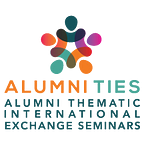Students Opposing Stigma: Demystifying the Realities of Substance Use Disorders
By Thomas Greey, Jalil Jones, and Brenda Marshall
The National Institute on Drug Abuse (NIDA), reported that 70,000 Americans died in 2017 due to illicit drug overdose, with many resulting from the addition of synthetic narcotic fentanyl. Substance Use Disorder (SUD) is recognized by health professionals as a diagnosis that affects people of all walks and stages of life. Use of illicit drugs by college students and adolescents has seen a steady rise since the 1990s (Mohler-Kuo, Lee, Wechsler, 2003). Nurses, doctors, and other healthcare professionals remain the first line of defense in preventing deaths in this population. Stigma, or the fear of being shamed or humiliated, has been identified as a barrier for those seeking help in seizing their substance use/abuse (Luoma et al., 2007).
The Alumni TIES seminar in April 2018, “Building Communities of Hope: Collective Action to Tackle Addiction,” inspired a project, funded through an Alumni TIES small grant from the U.S. Department of State. This educational project, Student Opposing Stigma (SOS), focused on substance use disorders and how to use Narcan, an opioid antagonist to partially or entirely reverse opioid overdose. SOS is administered at Geisinger Commonwealth School of Medicine led by Dr. O. Simoyan and a nursing department student SOS organization led by Dr. Brenda Marshall at William Paterson University of New Jersey (WPUNJ). Geisinger’s SOS program, through the work of Dr. Simoyan and Maureen Murtha, allowed medical students to become “reach-out champions” to local high school students educating them on general substance use disorders as well as implementing hands-on sessions by using mannequins in order to administer the opioid, Narcan. Narcan is a drug that is used to reverse the respiratory effects of opioid overdose, saving thousands of lives.
The WPUNJ SOS student group included undergraduate students from nursing and other departments interested in learning about and reducing stigma for those with substance use/abuse behaviors. The organization’s goal of reducing stigma through student outreach efforts was introduced by Dr. Brenda Marshall through research, general nursing, and psychiatric clinical classes. Surveys were distributed in a myriad of courses from different departments to determine the level of social distance a student felt comfortable with from those who used substances. The use of surveys also assessed student interest in participating in SOS. Student participant discussions and SUD education workshops were facilitated by Dr. Marshall and informative leaflets debunking myths were provided along with lists of local and national resources for those experiencing problems at home or at school. Weekly luncheons were held for students to discuss new ways to engage and educate peers about supporting help-seeking behaviors through talking, listening, and providing resources for those in need.
A connection between SOS and the local CARES organization has been established. The New Jersey Center for Addiction Recovery Education and Success (NJCARES), a peer to peer, volunteer-based recovery-oriented sanctuary that works to engage and organize the recovery community came to campus to provide Narcan delivery education for the nursing department. Each participant walked away with their own Narcan kit, CARES certification in Narcan administration, and additional knowledge about opioid overdose.
Dr. Marshall presented this research during the WPUNJ research symposium, entitled “Exploration Week.” This symposium was held at the end of the Spring 2019 semester where students shared their SOS experiences to provide a platform for student engagement. A noted weakness of the training sessions at WPUNJ was the inability of students to talk to those who were emotionally unstable or dependent on drug-related substances. When an invitation to become nationally certified in Mental Health First Aid (MHFA) arose, Dr. Marshall and another nursing professor, Dr. Atte, volunteered to administer the certification to students. With this new opportunity, SOS has another tool to reach students in need, as the Mental Health First Aid certification will soon be incorporated into the curriculum for all nursing students at William Paterson University.
Although the funding from the Alumni TIES grant is completed, SOS continues its work to reduce stigma against SUD and provide resources to those in need. While participating in SOS, we learned that we are not direct resources for help but that our empathy and willingness to listen can guide people in the right direction to seek professional help and treatment. Our journey to reduce stigma is an ongoing process. Dr. Marshall along with the chapter president, Maiya Arnold, were able to create an organization that will continue to research, identify, and reduce stigma pertaining to substance abuse. Our research arm, composed of two students, Thomas Greey and Jalil Jones, will continue to evaluate data that we collect to guide our efforts. Over 50 students have participated in the organization and we hope to see the numbers continue to grow. SOS is now being introduced to freshmen nursing students. Through MHFA and SOS, nursing students at WPUNJ will continue to address the importance of breaking through the stigmas surrounding SUD and supporting student engagement to aid help-seeking behaviors.
Luoma, J.B., Twohig, M.P., Waltz, T.J., Hayes, S.C., Roget, N.A., Padilla, M., & Fisher, G.L. (2007). An investigation of stigma in individuals receiving treatment for substance abuse. Addictive behaviors, 32(7), 1331–46.
Mohler-Kuo, M., Lee, J. E., & Wechsler, H. (2003). Trends in marijuana and other illicit drug use among college students: Results from 4 Harvard school of public health college alcohol study surveys: 1993–2001. Journal of American College Health, 52(1), 17–24.
Students Opposing Stigma (SOS) is funded through an Alumni TIES small grant from the U.S. Department of State.
